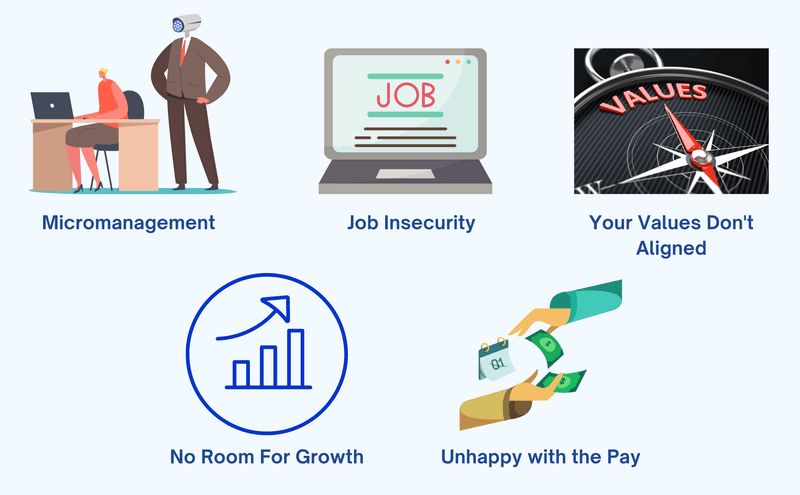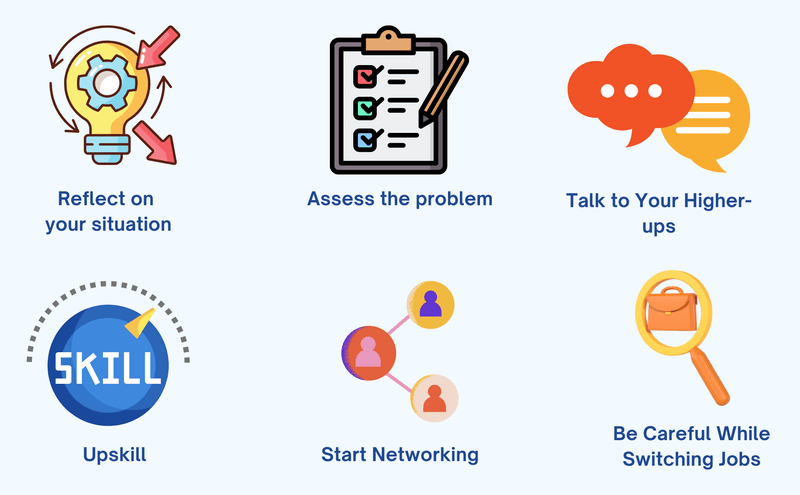Maybe it’s just a phase. Or it might have something to do with all the recent partying. No! Wait! Wait! It’s because you haven’t had a break in a while that you keep saying I hate my job. Maybe a few days off is all you need, and you’ll begin to like your job again.
We’re sorry to tell you this, but maybe you don’t like your job. Or worse still, perhaps you hate it. Yes! The same job that pays your bills and gives you all the money to spend on the stuff you love. So, what to do now to take control of your career?
Millions in the world likely want an answer to this question. A Gallup poll shows that a whopping 85% of people hate their jobs. So, what to do when you hate your job? Do you quit it and move on?
Finding a Sensible Solution
Quitting their job impulsively is not how a responsible person takes their life’s big decisions. There’s got to be a sensible way out. Fortunately, yes! You don’t have to make drastic decisions such as saying goodbye to your job one boring Monday.
This article will guide you on what to do when you despise your job. After all, it is not a good idea to storm out of your office someday and be left with nothing but rage in your heart.
So, stop writing that resignation letter. Take a sip of warm water and read on to find out what to do when you hate your job. But before that, let’s examine why people hate their jobs.
As they say, how can you solve a problem if you do not understand the problem?
Why Do I Hate My Job?
There are so many people in the world who are unemployed. There are more than 200 million unemployed people across the globe. So, isn’t it just too rich for people to harp about the jobs they do have?
Luckily, it’s not that simple, right? There are valid reasons why a person ends up hating their job. Let’s talk about some of the primary reasons why that happens. Hopefully, you can relate to some of them.

1) I Hate My Boss
Do you hate your boss? You're not alone, and that's something to consider. It's no secret that many people have a disgruntled relationship with their supervisor at work. Their personality, attitude, or opinions can make workplace relationships difficult and leave employees feeling frustrated and unmotivated.
It can be challenging to cope with the daily interactions of someone you don't care for. However, there are things you can do to manage the situation effectively. Determine what makes them so unbearable and, if possible, find ways to work around their personality flaws. Additionally, strive for a professional working relationship by always maintaining respect – even in difficult situations – and being honest but diplomatic when voicing your opinion or concern.
2) I Hate Working
Are you tired of working? Do you dread getting out of bed every morning because of your job? Millions of other people hate working, too. It's no secret that the daily grind can be a real struggle sometimes. And it’s not easy to understand what comes first; you don't like working because you don't want your job, or you don't like your job because you don't like working.
Perhaps the most common complaint among workers is that they feel underpaid or unappreciated at work. In today's economy, wages have stagnated while workloads have increased — leaving many employees demotivated, frustrated, and exhausted. Additionally, some workplaces are breeding grounds for stress and anxiety due to unhealthy environments or unreasonable employer expectations.
It doesn't have to be this way, though!
3) Micromanagement
Are you tired of your manager peeping into your computer screen? Do they keep reminding you about a task a trillion times? Do they want to know what took you five extra minutes at lunch? If you can relate to all of this, you are being micromanaged.
Studies have found nearly 80% of respondents claim that they are being micromanaged.
And around 65% of them say it forces them to look for other opportunities. So, you’re not alone if micromanagement is causing you to say I hate my job.
Managers should understand that their employees are adults. They should be treated as such and be left alone to accomplish their tasks within the stipulated timeline. If that bothers you the most, micromanagement is why you hate your job! Your managers don’t understand that?
4) Job Insecurity
Stability is something most professionals look for in their careers. Naturally, nobody likes to be unsure whether they will have a job next month. Or if the company is losing business and might have to let go of hundreds of its employees.
Research in the United States has shown that 15% of workers feel a constant risk of losing their job. And if you’re among these anxious Americans, it is understandable why you hate your job. It is because it gives you no sense of stability despite the hours you put in.
It is understandable if this is why you hate your job. In such a situation, the onus is on your employers. It gives you a clear idea of what’s happening with your professional situation and allows time for self-introspection.
5) Your Values Don’t Align
Ethical reasons alone can be more than enough for someone to look for a job switch. As long as an employee finds purpose and meaning in their job, they won’t look elsewhere for opportunities.
In fact, 9 out of 10 Americans are willing to take a pay cut for a more meaningful job. And they also tend to stay longer at a company if their career continues to challenge them and they feel their work is purpose-driven.
So, does your job lack this sense of purpose? Is the company you work for bereft of a mission? It might bleed into your motivation to work and end up extracting all the dedication out of you in only a few months.
6) No Room for Growth
Nobody would want to work the same job ten years from now. They look for growth and advancement when they take up a job opportunity. Not only do they want a rise in salary, but they also want to face new challenges.
According to McKinsey, 40% of workers leave their job because they sense a lack of career growth. After all, no one wants a stagnant career that seems to take them nowhere.
Sometimes, employees improve so much that their job no longer challenges them. So, the job that seemed challenging to them once doesn’t strike their fancy anymore.
If you feel the same, it is understandable why you might have grown to hate your job.
7) Unhappy With The Pay
Lastly, there comes the problem of an employee being unhappy with the pay. This is probably something that most unhappy employees can relate to. Low income is among the primary reasons why people quit their jobs.
And this stays the same almost every year, and the lack of sufficient pay is why people quit their jobs. So, this can be why you don’t feel like getting up every morning to show up at work.
So, ask yourself? Is any of the above reasons likely the cause of you saying I hate my job? If it is, read on for ways to escape this sticky situation.
Some Other Reasons Why People Hate Their Jobs
There are many other reasons why a person might hate their job. Some include toxic work culture, a lack of work-life balance, disregard for credit and bias, or the awareness that there are much better opportunities.
Whatever the reason, we have a step-by-step process to help you get out of this career swamp!
What To Do When You Hate Your Job?

1) Reflect on Your Current Situation
Take time out of all the work and socialization to assess your situation. Especially when you are simply going through the motions at your job, you tend to keep at it without thinking about it. That’s why taking a day off and analyzing your situation is essential.
Journaling or simply writing down what you dislike about your job might be an excellent way. What is the one thing that frustrates you at work? Is all the hate the cause of someone particular at the workplace? Does your boss or manager make you hate your job?
Ask yourself these questions and try to answer as honestly. It might be tough to do some honest self-assessment with all the stress at work, but you’ve got to try and start here! The sooner you analyze your current situation, the likelier you will find a quick way out.
2) Assess the Problem
If you evaluate your situation honestly, you will most likely be able to pinpoint the primary problem. You will know the one thing that makes the current job seemingly intolerable.
After all, your next step in the process will depend on that particular problem. Say you are unhappy with the pay or the lack of career growth. Or you might be facing any one of the problems we mentioned above.
You might also find out that you only need a change of perspective. You have to give your thoughts a positive spin, and you won’t hate your job so much after that. If that’s the case, you might want to continue.
But if no love is lost, you’ve got to move on to the next step.
3) Talk to Your Higher-Ups
You might have thought the next step be handing in your resignation. But it is always better to stay calm in such a situation. Even if your problem with the current job is as black and white as the lack of sufficient pay, it is better to communicate the same with your manager or concerned authorities.
But that’s where you have to be very honest. When having this conversation, you cannot afford to be afraid to express your dissatisfaction. Tell them what makes you unhappy with the job, and they might be able to tweak a few things in your favor.
But if this conversation bears no fruit, you might have to think about preparing yourself for the next job.
4) Upskill
What if, after all the analysis, you still hate your job? You realize that switching jobs is the only way to feel good about your career. That’s when you need to make yourself more employable.
And the key to doing that is to learn new skills. You can also start doing that while working in your current job. It will do two things for you, which are:
- Make you much more employable within your industry.
- Help you grow within your organization, which might result in improved job satisfaction.
So, learning a new skill will open a few doors for you. And guess what? You might end up hating your job to a lesser extent!
5) Start Networking
Upskilling might not be enough to get you out of a job you hate. And that’s where networking comes to the rescue. Even if you are not officially in the job market, networking will help you learn much about your industry.
Naturally, 79% of professionals say networking is crucial in their careers. That’s why so many professionals in various industries understand the value of networking.
Especially when you’re stuck with a job you hate, networking can prepare a way out for you!
6) Be Careful While Switching Jobs
You will most likely find another job with the right upskilling and networking. But that’s where you need to be careful. Take your time to weigh your options, and don’t be so desperate about leaving one place that you don’t examine where you’re going for.
After all, you don’t want to switch jobs only to end up in the same old situation again! It is always better to take the time to assess every problem that has to do with your career!
The Final Verdict
When you hate your job, everything seems to be the worst. And that’s when people end up making impulsive decisions. In this article, we tried our best to offer an alternative, step-by-step method of finding a way out.
After reading this, we hope you won’t be choosing the “storming out of the office” option. So, if you keep repeating the words “I hate my job,” save this article to remind yourself of the course to take.
And if you do decide to switch jobs. Remember to update your resume and write a stellar cover letter to go with it. We wish you all the luck in whatever decision you take!

Ranu Kumari is a Professional Writer and a Marketing enthusiast who currently runs her own Marketing Consultancy, LatitudeBOX. She has written promotional articles for multiple brands and has published her work in Scopus indexed journals. She is passionate about expressing her thoughts and ideas to connect with her readers in a voice that they understand.
